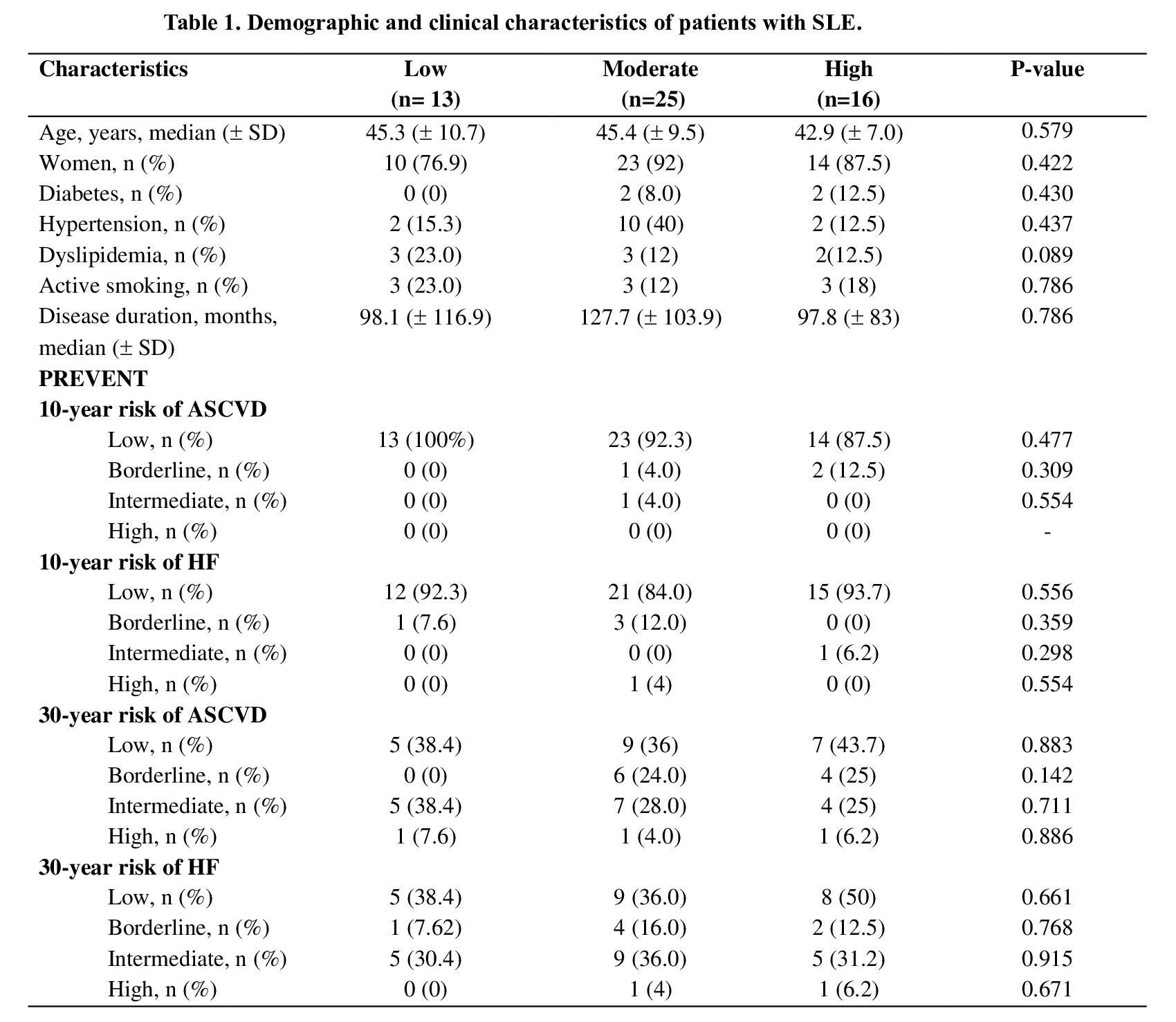Session Information
Session Type: Poster Session C
Session Time: 10:30AM-12:30PM
Background/Purpose: Increased disease activity by SLEDAI (Systemic Erythematosus Lupus Disease Activity Index) has been associated with higher cardiovascular risk (CVR) and atherosclerotic cardiovascular disease (ASCVD), for this reason, EULAR recommends maintaining a low score of this index. One of the most economical ways to measure CVR is through risk calculators. The Predicting Risk of Cardiovascular disease Events (PREVENT) algorithm is designed to determine the 10- and 30-year chances of both ASCVD and heart failure (HF). This algorithm can be used for populations starting at 30 years old, in contrast with other risk calculators that have a minimum age requirement of 40 years; the capability to use PREVENT with younger populations makes it particularly useful for patients with SLE. Due to this, we aim to associate the disease activity with ASCVD and HF risk using the PREVENT calculator.
Methods: A cross-sectional, descriptive study of patients aged 30-75 years who met the 2019 ACR/EULAR criteria for the diagnosis of SLE. Patients with previous myocardial infarction, stroke, or peripheral artery disease were excluded. For disease activity, the SLEDAI scale was used, which was classified into 3 groups: low (< 3 points), moderate (3-12 points), and high ( >12 points). Prediction of 10 and 30-year risk of atherosclerotic ASCVD and HF was estimated with the PREVENT algorithm, risk classification was estimated according to its guidelines. Group distribution was assessed using the Kolmogorov-Smirnoff test. Comparisons were made using the Chi-square test, ANOVA, or Kruskal-Wallis test, accordingly. A p-value of ≤0.05 was considered statistically significant.
Results: A total of 54 patients with SLE were included (Table 1). The mean age was similar in all groups (44.5) as well as comorbidities. Although no statistical differences were found, most of the patients with low and moderate SLEDAI were classified as low risk for 10-year ASCVD (100% and 92.3%, respectively), and no high-risk patients were found in any group. Patients with high-disease activity were mostly classified as low risk for HF at 10 years (93.7%). When we stratified for 30-year ASCVD and HF, the intermediate risk increased between groups. There were no patients with high risk for 10 or 30-year HF with low SLEDAI.
Conclusion: We found no association between CVR risk stratification and disease activity. This may be explained by the lack of traditional cardiovascular risk factors in our population, which are mostly considered for PREVENT calculation. Prospective studies with larger samples that contemplate the inflammatory component are necessary for a better approach in SLE patients.
To cite this abstract in AMA style:
Polina-Lugo R, Gonzalez Melendez A, Elizondo-Benitez M, Guajardo Aldaco A, Dominguez-Guerra A, Limas-Martínez V, Colunga Pedraza I, Galarza-Delgado D, Azpiri-Lopez j, Arvizu-Rivera R, Cardenas-de la Garza J. Cardiovascular Risk Measured by PREVENT Calculator and Disease Activity in Patients with Systemic Lupus Erythematosus [abstract]. Arthritis Rheumatol. 2024; 76 (suppl 9). https://acrabstracts.org/abstract/cardiovascular-risk-measured-by-prevent-calculator-and-disease-activity-in-patients-with-systemic-lupus-erythematosus/. Accessed .« Back to ACR Convergence 2024
ACR Meeting Abstracts - https://acrabstracts.org/abstract/cardiovascular-risk-measured-by-prevent-calculator-and-disease-activity-in-patients-with-systemic-lupus-erythematosus/

